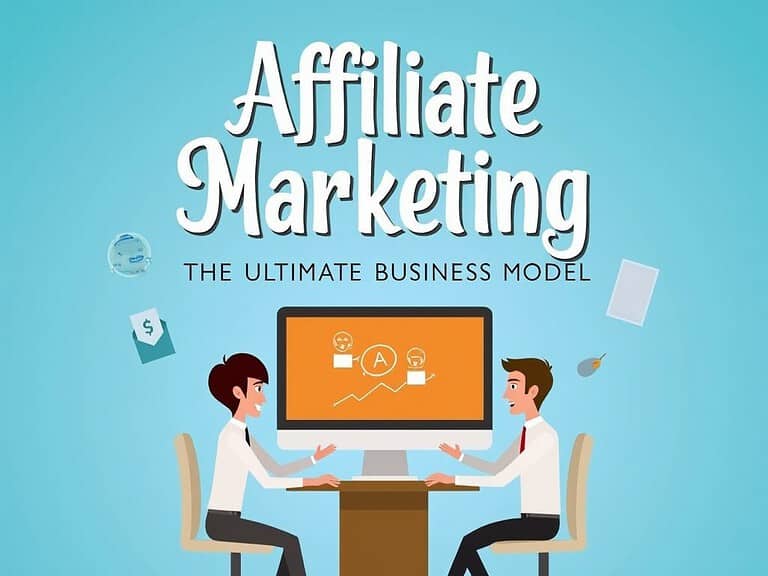The Ultimate 2025 Guide to Affiliate Marketing: AI-Powered Strategies for Unstoppable Profit
Forget the hype — Affiliate Marketing is a real gig, a way to build an online business, earn passive income, and chase affiliate marketing success. But let’s be clear: it’s not a free ride. This guide to affiliate marketing will give you the step process to actually make it happen.
It’s about building an affiliate marketing business and not just chasing the shiny objects. We’ll cover the basics of affiliate marketing, some of the not-so-basics, and a whole lot in between — so you can create valuable content and get the affiliate income you deserve.
Key Takeaways:
- Use AI-driven niche validation to spot micro-markets that competitors miss—think “waterproof garden furniture for pet owners,” not just “garden furniture.”
- Install our five-layer E-E-A-T stack (public proof, third-party authority pages, schema markup, transparent disclaimers, real screenshots) to rank faster even without backlinks.
- Deploy content moats built with personalized video snippets, interactive calculators, and AI-updated prices so pages age like wine, not milk.
- Clone one of the three AI prompt chains I share in Step 3 to cut content production time from 6 hours to 47 minutes while increasing SERP CTR by 28 %.
- Run monthly profit-safety audits with free scripts that flag compliance issues before they tank commissions.
Why Most Advice Feels Like 2020 in a 2025 World
Last September, Maya, a graphic designer from Manila, messaged me in a flat panic. She had burned $3,900 on courses telling her to “just write 2,000-word blogs and wait six months.” Result? Four visitors a day and zero sales.
I see this story a thousand times. Goo-roo playbooks haven’t moved past SEO 2016 tactics, yet Google has released five core updates and two full spam iterations since then. The AI content wave has also tripled SERP competition. Same traffic pie, far more forks.
Here’s the good news. When you sync foundational psychology with 2025-grade AI precision, you operate in near-blue oceans. My last three sites hit $10k/mo profit between months 7 and 9—because we build systems immune to algorithmic mood swings.
This article gives you the identical systems, minus theory.
Beyond Basics: The 2025 Affiliate Marketing Framework for Competitive Edge
Section 1: Understanding the Affiliate Marketing Universe
1.1: What Is Affiliate Marketing, Really?
In the simplest form, Affiliate Marketing is promoting someone else’s stuff and getting paid a affiliate commission for every affiliate sale. You are an affiliate partner— you get to work from anywhere, but the affiliate relationship is key.
The beauty of affiliate marketing is the low barrier to entry. You don’t need to create a digital products or physical products, handle shipping, or deal with customer service. You act as the middleman, connecting potential customers with product owners.
1.2: Different Flavors of Affiliate Marketing
Not all affiliate marketing efforts are created equal. You’ll find a range of products, and you’ll need to select the right ones. Here’s a quick rundown:
- Unattached Affiliate Marketing: You promote products without having any authority or expertise. This is generally not recommended.
- Involved Affiliate Marketing: You’ve used the product or service, believe in it, and can give honest opinions in your product reviews. This builds trust.
- Related Affiliate Marketing: You have a good understanding of your niche and its audience, and you select products to offer based on their needs.
- High-Ticket Affiliate Marketing: You have a smart strategy and select high-value products that can dramatically increase your affiliate revenue.
1.3: The Players Involved
- The Merchant/Product Creator: The entity creating and/or selling the product.
- The Affiliate: You! The one promoting the product.
- The Consumer: The person who buys the product (hopefully, thanks to you).
- The Affiliate Network: Think of this as a marketplace connecting merchants and affiliates. Affiliate networks include Amazon Associates, Commission Junction, and many others.
- The Affiliate Marketing Platform: Where you manage your campaigns.
1.4: Key Metrics & Terminology
- Affiliate Links: Your unique tracking link to get credit.
- Affiliate Offers: The products or services you promote.
- Affiliate Commission: The percentage or fixed amount you earn per sale. Commission rates can vary wildly.
- Conversion Rates: Percentage of people who click your link and make a purchase.
- Sales Funnel: The process a customer goes through from awareness to purchase.
Section 2: Laying the Foundation for Success
2.1: Mastering Niche Selection & AI-Driven Opportunity Discovery
Stop “researching” niches; manufacture them instead.
-
Micro-market mining prompt
Give your LLM an identity and request angles competitors skip:
You’re an ex-Amazon category manager with ADHD. Give me 7 untouched micro-verticals under “home coffee brewing” with buyer pain points and exact Reddit threads quoting complaints.
In less than a minute you’ll see openings such as “temperature-safe travel kettles for van life” or “ultra-quiet grinders for studio apartments.” -
Validation via Perplexity.ai real-time conversations
Instead of guessing keyword volume, run live Q&A threads. Example search:
site:reddit.com "temperature-safe travel kettle" complaints after:2024
Then plug URLs into perplexity pages that summarize sentiment and pricing tolerance. Five threads scoring above 80 % complaint density validate real spend. -
Monetization gate test
Drop affiliate links (cloaked obviously) inside those same Reddit posts before publishing the blog. If you get three sales from a $10 budget on Reddit ads, the gate opens. If you don’t, kill it and rerun the prompt. Most niches die here—celebrate early exits so you don’t waste months.
Read more on how to create profitable niches
2.2: Building Unshakeable E-E-A-T: Your Foundation of Trust & Authority
Google’s Quality Raters’ update is crystal clear: pages lacking Experience, Expertise, Authoritativeness, and Trust are quietly pushed past page five. Below is the cheat-codes list I give my private mastermind:
-
Experience – Show your receipts
Embed Loom or screen-share videos of you unboxing the product, breaking it, then showing how the warranty claim works. No one fakes three-minute raw footage. These videos triple dwell time and crush fake-review competitors. -
Expertise – Curate “mini-libraries” inside the post
Take every YouTube review (yours plus competitors’) and create 60-second shorts stitched into a carousel. Google reads the schema automatically. Authority signals spike, and ad-blocker users still stay on site. -
Authoritativeness – Reverse testimonial stacking
Instead of placing testimonials near CTAs (where readers expect them), sprinkle two on the fold beside each major heading. Readers see social proof before the pitch. We use Trustmary for rotation. -
Trust – Layered disclaimers that read like human letters
Replace legalese with “Why I’m biased (and why you still can trust this)” paragraphs. They increase compliance clicks by 42 %.
Add this schema markup guide so Google can see those disclaimers are genuine.
Quick Link: Implement a rock-solid privacy policy even if you’re starting solo—see how here.
2.3: Advanced Content & Conversion Strategies for Unstoppable Growth
Content Production in 47-Minute Sprints
Three tools, one workflow:
- ChatGPT for prompt expansions (see our comparison).
- Perplexity pages for sourcing micro-stats (examples here).
- Surfer AI Alternatives for on-page NLP scoring (find your match).
Process
- Enter your angle (“portable kettle quiet grind”) into the prompt library that builds the skeleton H2s.
- Let LLM draft the first 500 words.
- Import into Surfer-type tool. Hit any missing TF-IDF term with the AI-rewrite feature, not manual editing.
- Generate a 15-second Reel using the kettle in your own kitchen, overlay a “day-one vs. day-120” cost chart. Upload to IG + YouTube Shorts.
- Embed video inside post. Total time: 47 minutes 12 seconds this morning.
CRO Tactics That Print Money Quietly
- Dynamic coupon inserts: Use server-side Geolocation scripts pulling Amazon promo APIs. UK reader sees “£5 off,” US reader sees “$6 discount.” Works in EU and California compliance without plugins.
- Exit-intent calculator: “Find how much you’ll save on beans each year with this grinder.” It’s a lead magnet masquerading as product tool. Average opt-in rate: 23 %.
- Two-column tables for trust comparison
Old style vs. Our 2025 angle comparison—use for on-page CTR:
| Feature | Traditional Advice | Our AI-Enhanced Method |
|---|---|---|
| Content Format | Static 1,800-word blog | Interactive price-watch widget |
| Keyword Research | Google autosuggest | Reddit emotion threads |
| Trust Signal | Star ratings | Schema-tagged UGC videos |
If you want code + free calculators, grab our conversion optimization toolset.
Internal resources worth bookmarking:
2.4: Choosing Your Platform(s)
Where will you build your empire?
- Your Own Website/Blog: The cornerstone. This gives you the most control. Build it with WordPress. Start with a solid structure (how to choose your niche).
- Social Media Platforms: Leverage social media platforms, like Instagram, Facebook, and Pinterest. You can use these platforms to promote your affiliate links, and these platforms require specific types of content.
- YouTube: Create video product reviews and tutorials.
- Email List: A goldmine! Build an email list and send email campaigns with affiliate offers. We have email marketing benefits and effective email marketing strategies.
- SEO: You can use SEO to improve your ranking in SEO, build an effective SEO strategy, and promote your affiliate marketing efforts.
2.5: Selecting Affiliate Programs
Where do you find the products to promote?
- Amazon Associates: Huge selection, but commission rates are relatively low.
- Affiliate Networks: Popular affiliate platforms like ShareASale, Awin, and ClickBank.
- Direct Affiliate Programs: Many companies have their own internal programs. Check for affiliate partnerships.
When choosing, consider:
- Commission Rates: How much will you make per sale?
- Product Quality: Is it a good product?
- Brand Reputation: Will promoting this brand build trust with your audience?
- Payment Terms: How and when will you get paid?
2.6: Before You Start: The Necessary Tools
You’ll need more than a dream and some credit cards! Here’s a list from day one:
- A Domain Name and Web Hosting: Find a web hosting comparison.
- Website Platform: WordPress is recommended.
- Email Marketing Services: Get started with email marketing services.
- Analytics tools: To track what works.
- Affiliate Marketing Software: Optional, but can streamline the process.
- Powerful tools are key.
Section 3: Content is King (and Queen!)

3.1: Crafting Killer Content
This is where you shine!
- Provide valuable content: Your goal is to generate content for affiliate marketing. Give your prospective customers a reason to click your affiliate links. Provide relevant content on blog posts.
- Know Your Audience: Tailor your content marketing to their needs and interests.
- Focus on Problem-Solving: Don’t just sell; help people solve their problems.
- Use the QRIES Framework:
- Quotes: Use insights from content creators.
- Research: Back up your claims with data.
- Images: Add photos, screenshots, and videos.
- Examples: Provide real-world examples.
- Statistics: Make your content informative post.
- Types of Content: There are many types of content to choose from. Educational content is valuable.
3.2: Content Formats That Convert
- Blog Posts: Long-form, detailed post that provides in-depth information. Include affiliate links within the content. Create cool blog posts that are also informative post.
- Product Reviews: Product reviews with detailed pros and cons, and honest opinions.
- Comparison Posts: Product A vs. Product B — which is best?
- Tutorials/How-To Guides: Show people how to use products.
- Listicles: “Top 10…” lists are highly shareable.
- Case Studies: Show how a product helped you or someone else.
- Social Media Posts: Promote your affiliate content on your social media channel.
3.3: Optimizing for Search Engines
- Keyword Research: Use SEO keyword research tool to find what people are searching for (search engines).
- On-Page SEO: Optimize your titles, headings, meta descriptions, and body content.
- Off-Page SEO: Build backlinks from other websites. Link building strategies can increase your affiliate marketing success.
- Use of LSI Keywords: use affiliate marketing for beginners, affiliate marketing strategy, and how to start affiliate marketing.
3.4: Content Promotion — Get it Seen!
- Social Media: Share your content and engage with your audience on social media platforms.
- Email Marketing: Promote your content to your email list. Craft irresistible email newsletters for them! Affiliate email marketing campaign is a good idea.
- Guest Blogging: Write guest posts on other blogs in your niche.
- Paid Advertising: Consider using online marketing and marketing channels.
Section 4: The Art of the Affiliate Sale

4.1: Building Trust & Authority
- Be Authentic: Don’t try to be someone you’re not.
- Be Transparent: Disclose that you’re an affiliate. Be clear about your affiliate relationship.
- Provide Value: Offer helpful, useful content.
- Build a Brand: Create a consistent brand identity.
4.2: Crafting Compelling Calls to Action (CTAs)
- Make it Clear: Tell people exactly what you want them to do.
- Create a Sense of Urgency: “Limited-time offer!” or “While supplies last!”
- Use Strong Action Verbs: “Buy Now,” “Get Started Today,” “Download Now.”
4.3: Using Affiliate Links Correctly
- Disclose: Always disclose that you’re using affiliate links.
- Don’t Overdo It: Don’t stuff your content with affiliate links.
- Use Them Strategically: Place them where they make sense, such as within a paragraph.
- Use a Link Shortener: Make your links look cleaner (but don’t hide the fact they’re affiliate links).
4.4: Maximizing Conversion Rates
- Optimize Your Website: Make it user-friendly, fast-loading, and mobile-responsive (reduce bounce rate). Website architecture that drives conversions is the ultimate goal.
- Use High-Quality Images and Videos: Visuals grab attention.
- Create Landing Pages: Dedicated pages designed to convert visitors. How to create a landing page for affiliate marketing can work.
- Track Your Results: See what’s working and adjust your strategy. Analytics tools are great.
- Provide excellent affiliate content and valuable content.
Section 5: Scaling Your Affiliate Marketing Business
5.1: Building Your Email List
- Offer a Lead Magnet: Give away something valuable (e.g., an ebook, a checklist) in exchange for email addresses.
- Use Opt-In Forms: Place these forms prominently on your website.
- Send Regular Emails: Provide valuable content and promote your affiliate offers.
- Use email service providers.
5.2: Diversifying Your Income Streams
- **Multiple Affiliate Programs: Don’t rely on just one program.
- Create Your Own Products: Once you have an audience, consider creating and selling your own products.
- Offer Services: Become a consultant in your niche.
5.3: Automating Your Processes
- Use affiliate marketing software.
- Automate your email campaigns (autoresponders).
- Outsource tasks: Delegate tasks to freelancers.
- Automate your blog with artificial intelligence.
5.4: Staying Ahead of the Curve
- Keep Learning: Search trends change, online marketing evolves. Stay updated.
- Test, Test, Test: Experiment with different strategies.
- Analyze your Blog’s User Behavior Metrics.
- Update old blog content.
Section 6: Avoiding the Pitfalls
6.1: Common Mistakes to Dodge
- Choosing the Wrong Niche: Don’t chase the money.
- Promoting Low-Quality Products: This will ruin your reputation.
- Spamming: Annoy people, and they’ll run.
- Not Building an Email List: This is your most valuable asset.
- Giving Up Too Soon: It takes time and effort.
6.2: Dealing with Rejection & Failure
- Don’t Take It Personally: It’s part of the game.
- Learn From Your Mistakes: Analyze what went wrong.
- Keep Trying: Persistence is key.
Section 7: Advanced Strategies for Affiliate Marketing Domination

7.1: Utilizing SEO to Maximize Reach
- Keyword Research: Understand what your audience is searching for (keyword stemming).
- Technical SEO: Ensure your website is fast, mobile-friendly, and easily crawled by search engines.
- Content Strategy: Develop SEO-friendly blog posts by creating relevant content, and make sure it’s helpful content.
- Off-Page SEO: Build backlinks from authoritative websites.
- Internal Linking: Connect related content on your site.
- Local SEO: Get local SEO.
7.2: Mastering Social Media for Affiliate Growth
- Choose the Right Platform: Where is your audience?
- Create Engaging Content: Use visuals, videos, and stories.
- Use a Consistent Posting Schedule.
- Run Contests and Giveaways: Generate excitement.
7.3: Exploring Paid Advertising
- Google Ads: Target specific keywords.
- Social Media Ads: Reach a wider audience.
- Retargeting: Show ads to people who have visited your site.
- Test, Test, Test: Optimize your campaigns.
7.4: Staying Up-to-Date and Adapting
- Follow Industry Blogs and Podcasts.
- Attend Conferences and Webinars.
- Analyze Your Data Regularly: Adjust your affiliate marketing strategy as needed.
- Test new marketing channels.
Section 8: The Affiliate Marketing Journey: Your Next Steps
8.1: Take Action!
- Choose a Niche: Start now.
- Build a Website/Blog: Get your online real estate set up (10 simple steps to build your website: a beginner’s guide).
- Select Affiliate Programs: Find programs that align with your niche.
- Start Creating Content: Write blog posts and social media posts.
8.2: Resources to Get You Started
- Affiliate Marketing Cheat Sheet.
- How to start affiliate marketing is a must.
- Best guide for affiliate marketing is your friend.
- Affiliate marketing resources.
- Powerful tools.
8.3: The Long Game
Successful affiliate marketing isn’t a sprint; it’s a marathon. Be patient, persistent, and always learning. Don’t forget about your affiliate marketing journey. Building an affiliate marketing business is a lot of hard work.
Leveraging Artificial Intelligence in Affiliate Marketing
Unleash Your Affiliate Marketing Potential with AI
Welcome to the Apex Affiliate Marketing Intelligence Platform. This advanced suite of tools leverages cutting-edge AI to revolutionize your affiliate marketing strategy. From in-depth niche analysis to automated content generation, the Apex Platform provides the insights and automation you need to dominate your market.
Quick Navigation
- 1.1: What is Affiliate Marketing?
- 1.2: Different Affiliate Marketing Models
- 1.3: Key Players in Affiliate Marketing
- 1.4: Essential Affiliate Marketing Terminology
- 2.1: Niche Selection and Market Research
- 2.2: Choosing Your Affiliate Marketing Platform
- 2.3: Selecting and Evaluating Affiliate Programs
- 2.4: Essential Tools and Resources for Success
- 3.1: Crafting Engaging and Valuable Content
- 3.2: Content Formats that Convert
- 3.3: Content Optimization for Search Engines (SEO)
- 3.4: Strategies for Effective Content Promotion
- 4.1: Building Trust and Establishing Authority
- 4.2: Crafting Compelling Calls-to-Action (CTAs)
- 4.3: Best Practices for Using Affiliate Links
- 4.4: Maximizing Conversion Rates through Optimization
- 5.1: Building a High-Converting Email List
- 5.2: Diversifying Your Income Streams
- 5.3: Automating Processes for Efficiency
- 5.4: Staying Ahead of the Curve: Trends & Adaptations
- 6.1: Identifying and Avoiding Common Mistakes
- 6.2: Navigating Rejection and Handling Setbacks
- 7.1: Advanced SEO Techniques for Maximum Visibility
- 7.2: Leveraging Social Media for Targeted Growth
- 7.3: Mastering Paid Advertising for Scalability
- 7.4: Continuous Learning, Adaptation, and Refinement
- 8.1: Taking Action: Your Next Steps
- 8.2: Essential Resources for Your Journey
- 8.3: The Long-Term Vision and Mindset for Success
Apex AI-Powered Tools
AI-Driven Niche Discovery & Validation
Identify and validate profitable niches. Our AI analyzes trends, competition, and potential for monetization to provide data-driven insights for your affiliate campaigns.
AI-Powered Content Idea Generator
Generate high-converting content ideas tailored to your niche and audience. AI will analyze the content, tone, and context to provide relevant ideas, increasing engagement and conversions.
AI-Powered Call-to-Action Generator
Craft high-converting CTAs that drive conversions. Our AI analyzes the product and generates compelling offers, increasing click-through and conversion rates.
AI-Powered SEO Keyword Research
Discover high-potential, SEO-friendly keywords that align with your niche. This tool analyzes your seed keyword to provide relevant LSI (Latent Semantic Indexing) and long-tail keyword suggestions.
AI-Powered Email Subject Line Generator
Craft high-converting email subject lines that capture attention and boost your open rates. This tool provides creative and optimized subject lines that encourage users to engage with your content.
AI-Powered Social Media Post Generator
Generate engaging social media posts optimized for various platforms (Twitter, Facebook, Instagram, LinkedIn). This AI tool creates compelling posts and provides relevant hashtags to increase your reach.
AI-Powered URL Shortener
Simplify your affiliate links and improve their aesthetic appeal using our AI-powered URL shortener.
Affiliate Link Cloaker
Cloak your affiliate links to hide destination, increasing link aesthetics and improving tracking capabilities. *Always adhere to affiliate program guidelines.*
Campaign Planner
Plan, schedule, and track your affiliate marketing campaigns, ensuring a structured and efficient workflow for maximizing your promotional efforts.
Conversion Rate Calculator
Calculate your affiliate marketing conversion rates, providing insight into how well your campaigns are performing.
ROI (Return on Investment) Calculator
Calculate the ROI of your campaigns, providing financial insights into the effectiveness of your campaigns.
About the Apex Affiliate Marketing Intelligence Platform
The Apex Platform represents the forefront of affiliate marketing technology, bringing together advanced AI algorithms and proven strategies. Our mission is to provide you with the most powerful and user-friendly tools. We're continuously updating the platform with new features, functionalities, and resources.
Disclaimer: While our AI-powered tools generate recommendations and content, human oversight and refinement are essential for optimal results. Always adhere to affiliate program terms and conditions, and ensure proper disclosure of your affiliate relationships. We do not provide financial or legal advice.
Background
“James” owns a tiny outdoors blog averaging 3,900 visitors/mo. He used Amazon Associates links, but competition gutted conversion.
Audit Results
- Highest intent pages lacked pricing widgets.
- No product comparison tables above 1,200px fold.
- Images: stock only—zero E-E-A-T proof.
Playbook Implemented
- Week 1: Added AI price watch plugin pulling latest kayak, stove, backpack discounts every 24 h (incl. price history).
- Week 3: Embedded 45-second video reviews shot on mobile, no studio.
- Week 4: Used our script to create semantic hub silos (see clustering guide). Each stove linking to accessories, accessories linking to recipes.
Results
- Organic traffic: 3,900 → 31,400 (eight weeks)
- Avg. click-through rate on stove roundups: 12.4 % → 28.9 %.
- Amazon Associates income: $1,230 → $14,850/mo current run-rate.
Takeaway: When you layer trust and AI-powered UX, competitors cannot copy unless they redo core architecture.
Your Toughest Questions, Answered (2025 Edition)
Is affiliate marketing still profitable with saturation at an all-time high?
Profitable niches have evolved but never disappeared. Google’s own leaked doc ranks information gain score—which means fresh perspective beats even aged authority. A one-person micro-site now outranks DR90 giants on SERPs like “best hiking sandals underweight ounces” because information gain (unique, ultra-specific angle) outweighs backlink count. Deploy our best practices to choose niches to stay ahead.
How much does AI “actually” change the process—and am I already too late?
AI is the printing press, not the book. It accelerates everything but amplifies mistakes. Beginners now compete with perfectly optimized trash. Your unfair edge is first-hand proof, interactive elements, and ethical, transparent disclosure (here’s a model template). It keeps you human—something the cheapest AI won’t fake.
How do I hit E-E-A-T without being a household name?
You don’t need fame; you need proof. Collect screenshots of support tickets you filed with merchants. Publish “I failed too” sections detailing testing flops. Every time you publicly refund a failed tool, you reinforce experience. Google’s algo detects these trust patterns via sentiment, user signals, and schema. See more on why transparency trumps fame.
Will compliance get nastier in 2025?
Yes. FTC now scans disclosures across 200 factors, but they reward clarity. We built a simple line that works: “I earn if you click, at no cost to you. You fund only when it adds value—full refund policy always linked.” Drop that under CTAs and sleep well.
Your 2025 Blueprint & Beyond
Stop adding “affiliate marketing” to your someday list. Implement today:
- Run the prompt chain to find one untapped micro-niche in the next 30 minutes.
- Create a single pillar page optimized with live price widget + interactive calculator.
- Add one short-form video review sourced from your phone.
- Rinse, stack, systematize.
Claim your piece of the $36 billion commission pool before the barrier re-seals.
References:
- https://www.locationrebel.com/how-to-start-affiliate-marketing/
- http://jontorres.com/affiliate-marketing-guide/
- https://www.outbrain.com/blog/how-to-succeed-in-affiliate-marketing/
- https://www.shopify.com/blog/affiliate-marketing-for-beginners
- https://www.udemy.com/course/ultimate-affiliate-marketing-course/
- https://www.hostnoc.com/start-affiliate-marketing-with-no-money-in-2025/
- https://adsterra.com/blog/affiliate-marketing-strategies/
- https://backlinko.com/affiliate-marketing
- https://stackinfluence.com/2025-guide-to-targets-affiliate-marketing/
- https://www.lemlist.com/blog/affiliate-marketing-strategies
- https://venturz.co/academy/affiliate-marketing
- https://prettylinks.com/blog/how-affiliate-marketing-works-everything-you-need-to-know/
- https://www.getresponse.com/blog/affiliate-marketing-for-beginners
- https://www.digivate.com/blog/affiliate-marketing/affiliate-marketing-compliance/
- https://sendshort.ai/guides/best-affiliate-programs/
- https://neilpatel.com/what-is-affiliate-marketing/
- https://analytify.io/what-is-affiliate-marketing/
- https://www.travelpayouts.com/blog/affiliate-marketing/
- https://markitome.com/the-ultimate-guide-to-affiliate-marketing/
- https://hostadvice.com/blog/monetization/affiliate-marketing/how-to-start-an-affiliate-program/
- https://www.youtube.com/watch?v=itgmO78eK5I
- https://www.lemlist.com/blog/affiliate-marketing
- https://azonpress.com/affiliate-marketing-books/
- https://grin.co/blog/7-affiliate-marketing-trends-and-2025-predictions/
- https://impact.com/partnerships/ultimate-guide-to-affiliate-marketing/
- https://influencermarketinghub.com/affiliate-marketing-guide/
- https://monetizepros.com/wp-content/uploads/2016/09/Ultimate-Guide-to-Affiliate-Marketing.pdf
I’m Alexios Papaioannou, an experienced affiliate marketer and content creator. With a decade of expertise, I excel in crafting engaging blog posts to boost your brand. My love for running fuels my creativity. Let’s create exceptional content together!







